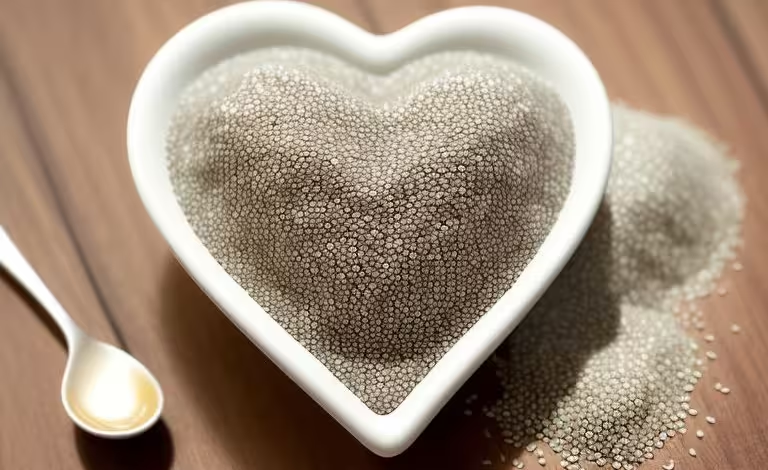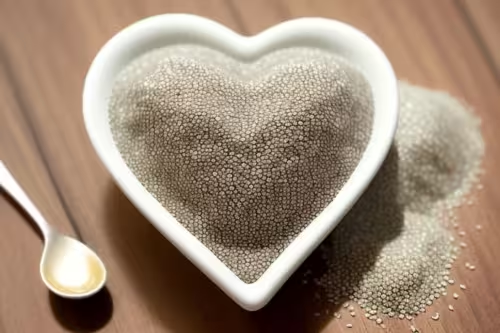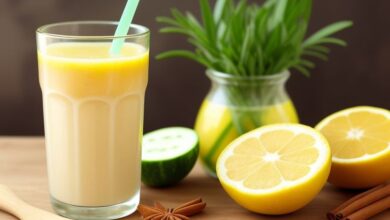
10 Amazing Benefits of Chia Seeds for High Cholesterol
What Are Chia Seeds?
Chia seeds are tiny black or white seeds from the plant Salvia hispanica, a relative of mint. Despite their small size, they pack a powerful nutritional punch and have been used for centuries as a staple food. Recently, chia seeds have gained popularity for their potential health benefits, including their ability to help manage high cholesterol levels. But how do these tiny seeds help with cholesterol, and what makes them so special?
Understanding High Cholesterol
Before diving into the benefits of chia seeds, let’s understand what high cholesterol is and why it’s a problem. Cholesterol is a waxy substance found in your blood, and your body needs it to build healthy cells. However, too much cholesterol can lead to fatty deposits in your blood vessels, increasing the risk of heart disease. High cholesterol is often caused by poor diet, lack of exercise, obesity, smoking, and genetics.
How Chia Seeds Help Lower High Cholesterol
Chia seeds can be a powerful ally in the fight against high cholesterol. Here are ten reasons why incorporating chia seeds into your diet can be beneficial:
1. High in Fiber
Chia seeds are incredibly high in fiber, which can help lower cholesterol levels. Fiber binds with cholesterol in the digestive system, preventing it from being absorbed into the bloodstream. Instead, it’s excreted from the body, reducing overall cholesterol levels.
2. Rich in Omega-3 Fatty Acids
Omega-3 fatty acids are essential fats that have numerous health benefits, including lowering cholesterol. Chia seeds are one of the best plant-based sources of omega-3 fatty acids. These healthy fats help reduce bad cholesterol (LDL) and increase good cholesterol (HDL).
3. Antioxidant Properties
Chia seeds are loaded with antioxidants, which protect the fats in the seeds from going rancid. Antioxidants also fight free radicals in the body, reducing oxidative stress and inflammation. This can help lower cholesterol levels and improve heart health.
4. Protein-Packed
Protein is essential for overall health and can aid in cholesterol management. Chia seeds contain a decent amount of high-quality protein, making them an excellent addition to a heart-healthy diet. Protein helps in muscle repair and growth, and can also help keep you full, reducing the temptation to snack on unhealthy foods.
5. Low in Calories
Despite being nutrient-dense, chia seeds are relatively low in calories. This makes them an excellent choice for those looking to lose weight or maintain a healthy weight, both of which are crucial for managing cholesterol levels.
6. Stabilizes Blood Sugar Levels
Chia seeds can help stabilize blood sugar levels, which is important for overall health and cholesterol management. Stable blood sugar levels prevent insulin spikes, reducing the risk of developing type 2 diabetes and associated high cholesterol.
7. Promotes Digestive Health
The high fiber content in chia seeds promotes digestive health by keeping the digestive tract moving smoothly. A healthy digestive system is essential for the proper absorption and elimination of cholesterol.
8. Hydration Boost
Chia seeds can absorb up to 10 times their weight in water, forming a gel-like substance. This property can help keep you hydrated and full, reducing the likelihood of overeating. Staying hydrated is important for overall health and can support cholesterol management.
9. Easy to Incorporate into Your Diet
Chia seeds are versatile and easy to add to your diet. You can sprinkle them on salads, mix them into smoothies, or use them to thicken soups and stews. Their mild flavor means they won’t overpower other ingredients, making them a convenient and tasty addition to your meals.
10. Gluten-Free
For those with gluten intolerance or celiac disease, chia seeds are a safe and nutritious option. They provide essential nutrients without the gluten, making them a great alternative for maintaining a heart-healthy diet.

How to Use Chia Seeds for High Cholesterol
Now that you know the benefits, here are some easy ways to incorporate chia seeds into your daily routine:
- Smoothies: Add a tablespoon of chia seeds to your morning smoothie for an extra boost of fiber and omega-3s.
- Oatmeal: Sprinkle chia seeds on your oatmeal or yogurt for a nutritious breakfast.
- Baking: Use chia seeds in baking recipes, such as muffins, bread, and cookies, to add a healthy twist.
- Pudding: Make chia seed pudding by mixing chia seeds with almond milk and a sweetener of your choice. Let it sit overnight for a delicious and healthy dessert.
- Salads: Add chia seeds to your salads for a crunchy texture and extra nutrients.
Chia Seed Recipes to Lower Cholesterol
Here are a few delicious recipes to get you started on your chia seed journey:
Chia Seed Pudding
Ingredients:
- 1 cup almond milk
- 3 tablespoons chia seeds
- 1 tablespoon honey or maple syrup
- 1/2 teaspoon vanilla extract
- Fresh fruits for topping
Instructions:
- In a bowl, mix almond milk, chia seeds, honey, and vanilla extract.
- Stir well to combine.
- Let the mixture sit for about 10 minutes, then stir again to prevent clumping.
- Cover the bowl and refrigerate for at least 4 hours or overnight.
- Serve with fresh fruits on top.
Chia Seed Smoothie
Ingredients:
- 1 cup unsweetened almond milk
- 1/2 cup frozen berries
- 1 banana
- 1 tablespoon chia seeds
- 1 teaspoon honey
Instructions:
- Combine all ingredients in a blender.
- Blend until smooth.
- Pour into a glass and enjoy immediately.
Chia Seed Bread
Ingredients:
- 2 cups whole wheat flour
- 1/2 cup chia seeds
- 1 tablespoon baking powder
- 1/2 teaspoon salt
- 1 cup almond milk
- 1/4 cup olive oil
- 2 tablespoons honey
Instructions:
- Preheat your oven to 350°F (175°C).
- In a large bowl, combine the flour, chia seeds, baking powder, and salt.
- In another bowl, mix the almond milk, olive oil, and honey.
- Combine the wet and dry ingredients and stir until well mixed.
- Pour the batter into a greased loaf pan.
- Bake for 45-50 minutes or until a toothpick inserted into the center comes out clean.
- Allow the bread to cool before slicing.
Potential Side Effects of Chia Seeds
While chia seeds offer many benefits, it’s important to consume them in moderation. Eating too many chia seeds can lead to digestive issues, such as bloating and gas, due to their high fiber content. Additionally, some people may be allergic to chia seeds, so it’s best to start with a small amount and monitor your body’s response.
Tips for Buying and Storing Chia Seeds
When buying chia seeds, look for high-quality, organic options to ensure you’re getting the best nutrients without any harmful additives. Store chia seeds in an airtight container in a cool, dry place to keep them fresh for longer. They can also be stored in the refrigerator for added freshness.
Chia seeds are a nutritional powerhouse that can play a significant role in managing high cholesterol. Their high fiber and omega-3 content, along with other health benefits, make them an excellent addition to a heart-healthy diet. By incorporating chia seeds into your daily meals, you can take a proactive step towards better heart health and overall well-being. Remember, while chia seeds are beneficial, they should be part of a balanced diet and healthy lifestyle for the best results. So why not start today and enjoy the numerous health benefits of chia seeds?
FAQs About Chia Seeds and Cholesterol
1. How much chia seeds should I eat to lower cholesterol?
It’s generally recommended to consume about 1-2 tablespoons of chia seeds per day. This amount can provide the necessary fiber and omega-3 fatty acids to help manage cholesterol levels.
2. Can chia seeds cause any side effects?
While chia seeds are safe for most people, consuming too many can lead to digestive issues like bloating and gas due to their high fiber content. It’s important to start with a small amount and gradually increase your intake.
3. Are chia seeds suitable for everyone?
Chia seeds are generally safe for most people, but those with allergies to chia or other seeds should avoid them. If you have any medical conditions or are on medication, it’s best to consult with your healthcare provider before adding chia seeds to your diet.
4. How long does it take to see results from eating chia seeds?
The effects of chia seeds on cholesterol levels can vary from person to person. It’s important to be consistent with your intake and combine it with a healthy diet and lifestyle for the best results. Some people may see improvements within a few weeks, while others may take longer.
5. Can I eat chia seeds raw?
Yes, chia seeds can be eaten raw. They can be sprinkled on salads, mixed into smoothies, or added to yogurt. However, soaking chia seeds before eating can improve their digestibility and nutrient absorption.
By incorporating chia seeds into your diet, you can harness their powerful benefits to help manage high cholesterol and improve your overall health. Start experimenting with these tiny seeds today and enjoy a healthier, heart-friendly lifestyle.




